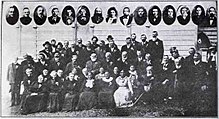
Back النيوزيلنديين الالمان ARZ Siedlungsgeschichte deutschsprachiger Einwanderer in Neuseeland German Німецькі новозеландці Ukrainian
 | |
 The German settlers of Puhoi, 1863. They came from Stod (Staab) in Bohemia, in the modern-day Czech Republic. | |
| Total population | |
|---|---|
| German 16,818 Immigrants (2018)[1]plus an estimated 200,000 of German descent | |
| Regions with significant populations | |
| Auckland, Manawatū-Whanganui, Tasman District, Bay of Plenty, Greater Wellington, Te Tai Poutini | |
| Languages | |
| New Zealand English, Māori, German | |
| Religion | |
| Predominantly Lutheranism and Roman Catholicism | |
| Related ethnic groups | |
| Germans, German Australians, German Americans, German Canadians, French Germans, British Germans |
German New Zealanders (German: Deutsch-Neuseeländer Māori: Tāngata Aremania o Aotearoa)[a] are New Zealand residents of ethnic German ancestry. They comprise a very large amount of New Zealanders in terms of heritage, with some 200,000 people from the country having at least partial German ancestry (approximately 5% of the population from an estimate in the 2000s).[2] New Zealand's community of ethnic German immigrants constitute one of the largest recent European migrant groups in New Zealand, numbering 12,810 in the 2013 census. 36,642 New Zealanders spoke the German language at the 2013 census, making German the seventh-most-spoken language in New Zealand.[3]
Germans first began immigrating to New Zealand in the 1840s. Between 1843 and 1914 around 10,000 arrived, mainly from northern Germany, but also from Prussia, the Sudetenland and Bohemia. One of the first ethnic Germans to explore New Zealand was the mercenary Gustavus von Tempsky, who was killed in armed conflict during the New Zealand Wars. From the 1840s to the 1860s, German immigrants established several rural communities. Ranzau (now Hope) was one of several ethnic German settlements in the Tasman, where settlers planted orchards and vineyards. Puhoi, built by Bohemian Germans, was a settlement north of Auckland on the boundary with the Dalmatian settlement of Dargaville, with whom Germans competed for the kauri gum trade.
Relationships with Germany were stained twice in the twentieth century, during both world wars and the New Zealand conquest of German Samoa. Today, New Zealand and Germany have a strong relationship, and there is frequent movement of people between each country for work, immigration and tourism. Many German immigrants, who today are mostly present in Wellington and Auckland, hold traditional Christmas markets and language classes, as well as Oktoberfests.[2][4][5]
- ^ "2018 Census ethnic group summaries | Stats NZ".
- ^ a b Taonga, New Zealand Ministry for Culture and Heritage Te Manatu. "Germans". teara.govt.nz. Retrieved 19 February 2022.
- ^ "Top 25 Languages in New Zealand | Ministry for Ethnic Communities". www.ethniccommunities.govt.nz. Retrieved 19 February 2022.
- ^ "German Christmas Market Green Bay". Eventfinda. 28 November 2020. Retrieved 19 February 2022.
- ^ "Have yourself a merry little Oktoberfest in New Zealand". NZ Herald. Retrieved 19 February 2022.
Cite error: There are <ref group=lower-alpha> tags or {{efn}} templates on this page, but the references will not show without a {{reflist|group=lower-alpha}} template or {{notelist}} template (see the help page).